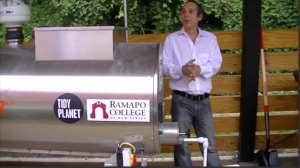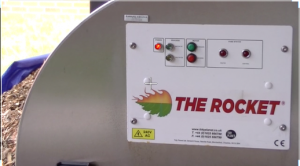- About Ramapo
- Academics
- Admissions & Aid
- Student Life
- Athletics
- Alumni
- Arts & Community
- Quick Links
- Apply
- Visit
- Give
Ramapo Green
January 11, 2016Post-Consumer Food Waste Audit at The Trustees Pavilion
The Post-Consumer Food Waste Audit was a project run by the student environmental club 1STEP, Dining Services and the President’s Committee on Campus Sustainability. The Waste Audit Project, in fact grew from a coincidental conversation with Dining Services Operations Manager, Mr. David Carreras. While dining at The Trustees Pavilion, I noticed the absence of waste segregation at the dish disposal station. Incidentally, while returning dishes I met Mr. Carreras at the dish disposal station and the simple question of “Why not”—“Why is Ramapo not segregating organic waste to compost”—got us to talk more about it, and sparked the plan for a waste audit.
The enthusiastic support from Mr. Carreras, and interest from student clubs and Dr. Vasishth led to the launch of a pilot project to assess compostable food waste and to brainstorm ways to reduce food waste in the dining halls. Although it was initially daunting to find enough people to cover 37 hours in a week without compensation or course credits, with overwhelming help from 1STEP, the daunting task of implementing a waste audit became doable and we gathered a group of very committed students participate in the project. The pilot food waste audit project was implemented from October 26–30, 2015 and it’s objective was to measure food waste per plate during meal times at the Pavilion dining hall.
We audited waste from every plate during meal hours at Pavilion dining hall, for five consecutive days. Students were provided instructions to put their food waste in a special bucket. We kept track of both number of plates that scraped waste into the bucket and number of buckets that were filled by food waste. Our data on food waste showed that in the Pavilion dining hall, total food waste from that week was 403.4 pounds from 1637 plates.
| Day 1 | 410 plates | 102 lbs. of waste |
| Day 2 | 367 plates | 89 lbs. of waste |
| Day 3 | 310 plates | 84 lbs. of waste |
| Day 4 | 345 plates | 79 lbs. of waste |
| Day 5 (no dinner) | 205 plates | 49 lbs. of waste |
| Average Breakfast/Lunch Plates: | 210.4 | |
| Average Breakfast/Lunch Waste (lbs.): | 47 | |
| Average Dinner Plates: | 146.25 | |
| Average Dinner Waste (lbs.): | 42.1 | |
| Average Daily Plates: | 327.4 | |
| Average Daily Waste (lbs.): | 80.68 | |
| Average Waste/Plate (lbs.): | 0.246 | |
| Total Weakly Plates: | 1637 | |
| Total Weakly Waste (lbs.): | 403.4 | |
Our data show us that the very act of auditing reduced food waste to some extent—a progressive decline was perceptible over the five days of the audit. The most surprising observation was that desserts were the most discarded food from plates—though we did not quantify it. Maybe the next audit will quantify desserts wasted form food plates separately. This could possibly be the beginning of a new conversation on campus about food waste and health.The task was difficult and required great organizational skills, as many a times it meant phone conferences at 10 p.m., managing e-mails and scheduling meetings, updating information with Sodexo, etc. Unplanned events such as low battery on scale or something simple as not having a pen to note the data or just making sure that we had student presence through the day—in the midst of classes—to collect data were a few other obstacles. Despite the challenges, working in the cafeteria and asking students to segregate their food waste into compostable material was a rewarding experience. There was great enthusiasm for the project and most diners were keen to support us, and appreciated our initiative. A lady took a photo of me to share with a friend the wonderful initiative we have at Ramapo. Some diners were sorry for not having enough food waste to participate. Yes, there were some people who did not have a clue what “compostable” means and also, some were not too keen on engaging in a sustainability project; however they were a minority. What I learned the most is that with work and commitment it is easy to make a positive change.
Written by Francis Gryglak
Categories: campus sustainability, dining services, food waste
December 23, 2014Rocket Composter Now Operational On Campus
Ramapo College has installed a Rocket Composter, behind the Pavilion Dining Hall. We ran it on a trial basis this past Fall, to get a feel for operations and output, and will begin composting in earnest after the Winter Break.
We have assembled a team of volunteers, who have taken responsibility for feeding and maintaining the Composter on a regular basis. This involves feeding the vessel twice a day, with a varying mix of food waste and wood chips, cleaning the filter once a week, and cleaning the outside of the vessel periodically.
If you have an interest in becoming part of this team of Rocketeers, let me know and we will integrate you into the team.
Ashwani Vasishth
Chair, President’s Committee on Campus Sustainability
vasishth@ramapo.edu
Categories: composting, food waste
Copyright ©2025 Ramapo College Of New Jersey. Statements And Policies. Contact Webmaster.




Follow Ramapo Green